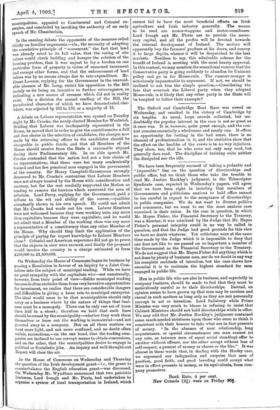A debate on Labour representation was opened on Tuesday night
by Mr. Crooks, the newly-elected Member for Woolwich. Holding that Labour was inadequately represented in the House, be moved that in order to give the constituencies a full and free choice in the selection of candidates, the charges now made by the returning officer to the candidates should be chargeable to public funds, and that all Members of the House should receive from the State a reasonable stipend during their Parliamentary life. In an able speech Mr. Crooks contended that the nation had not a free choice of iis representatives, that there were too many academically trained and too few practical men engaged in the government of the country. Sir Henry Campbell-Bannerman strongly demurred to Mr. Crooks's contention that Labour Members were not always treated by the House with consideration and courtesy, but for the rest cordially supported the Motion as tending to remove the barriers which restricted the area of selection. Lord Percy, replying for the Government, paid a tribute to the wit and ability of the mover,—qualities abundantly, shown in his own speech. He could not admit that Mr. Crooks had made out his case. Labour Members were not welcomed because they were working men, any more than capitalists because they were capitalists, and he would not admit that a Member of the working class was any more a representative of a constituency than any other Member of the House. Why should they limit the application of the principle of paying for expert knowledge to Labour Members alone? Colonial and American experience did not go to prove that the objects in view were secured, and finally the proposal would involve the country in a charge estimated at from £250,000 to 21,500,000.










































 Previous page
Previous page